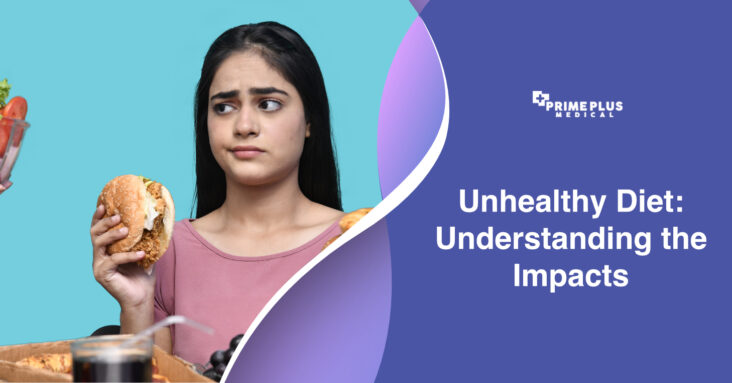Maintaining a healthy diet is crucial for overall well-being. Unfortunately, in today’s fast-paced world, unhealthy eating habits have become a common occurrence. Unhealthy diets can lead to a range of adverse effects on our health, including obesity, heart disease, and nutritional deficiencies. In this article, we will delve into what constitutes an unhealthy diet, explore its impacts on our body, and provide valuable tips and tricks for adopting a healthy and balanced eating plan.
What is an Unhealthy Diet?
An unhealthy diet refers to a pattern of eating that includes excessive consumption of processed foods, high levels of added sugars, unhealthy fats, and insufficient intake of essential nutrients. It often involves the overconsumption of calorie-dense but nutrient-poor foods such as fast food, sugary beverages, and snacks.
Impact of an Unhealthy Diet
- Obesity and Weight Gain: One of the most noticeable impacts of an unhealthy diet is weight gain and obesity. Consuming excessive calories without adequate nutrient content leads to the accumulation of body fat, resulting in a higher risk of obesity-related health conditions like diabetes, high blood pressure, and certain types of cancer.
- Nutritional Deficiencies: Unhealthy diets often lack the necessary vitamins, minerals, and antioxidants needed for optimal health. This deficiency can lead to weakened immune systems, fatigue, poor concentration, and an increased susceptibility to illnesses.
- Increased Risk of Chronic Diseases: A diet high in processed foods, unhealthy fats, and added sugars contributes to an increased risk of chronic diseases such as heart disease, stroke, and certain types of cancer. These foods are typically low in essential nutrients and contain harmful additives that can harm our cardiovascular system and overall health.
- Mental Health Issues: Research suggests a strong connection between unhealthy diets and mental health issues such as depression and anxiety. Nutrient deficiencies and the presence of harmful substances in processed foods can negatively affect brain function and mood regulation.
Why Do People Follow Unhealthy Diets?
Several factors contribute to the prevalence of unhealthy diets among individuals. Here are some common reasons:
- Convenience: In our fast-paced world, processed and fast foods offer convenience and time-saving options. However, these foods often lack nutritional value and tend to be high in unhealthy fats, sodium, and sugars.
- Emotional Eating: Many individuals turn to food as a coping mechanism for stress, anxiety, or other emotional triggers. Unfortunately, these comfort foods are typically unhealthy and provide temporary relief while harming long-term health.
- Lack of Nutrition Education: Limited knowledge about nutrition and healthy eating practices can lead people to make poor dietary choices. Without understanding the importance of balanced meals, they may rely on convenience foods or fad diets.
- Advertising and Marketing: Aggressive advertising and marketing campaigns by the food industry often promote unhealthy products, making them appear attractive and appealing to consumers.
Tips and Tricks for a Healthy Diet
The consequences of an unhealthy diet are far-reaching and detrimental to our health. Here are some of the key impacts associated with a poor dietary pattern:
- Eat a Balanced Diet: Focus on consuming a variety of nutrient-rich foods such as fruits, vegetables, whole grains, lean proteins, and healthy fats. Aim to create balanced meals that provide a mix of macronutrients (carbohydrates, proteins, and fats) and micronutrients (vitamins and minerals) essential for proper bodily functions.
- Limit Processed Foods and Added Sugars: Reduce your intake of processed and packaged foods, which are often high in unhealthy fats, sugars, and sodium. Instead, choose whole, unprocessed foods that provide natural sources of nutrients.
- Portion Control: Be mindful of portion sizes to prevent overeating. Use smaller plates, eat slowly, and pay attention to your body’s hunger and fullness cues. This approach can help you maintain a healthy weight and avoid unnecessary calorie consumption.
- Hydration is Key: Drink plenty of water throughout the day to stay hydrated. Water helps regulate bodily functions, aids digestion, and keeps your skin healthy. Limit your intake of sugary beverages such as soda, energy drinks, and fruit juices, as they are high in added sugars and empty calories.
- Plan and Prepare Meals: Planning and preparing your meals in advance can help you make healthier choices and avoid relying on fast food or unhealthy snacks. Batch cook, pack your own lunch, and have healthy snacks readily available to resist the temptation of unhealthy options.
- Mindful Eating: Pay attention to your eating habits by practicing mindful eating. Slow down, savor each bite, and listen to your body’s hunger and fullness cues. Avoid distractions like screens or eating on-the-go, as they can lead to mindless overeating.
Prioritizing a healthy diet is vital for maintaining good health and preventing various health conditions associated with an unhealthy diet. By understanding the impact of poor dietary choices, identifying the reasons behind unhealthy eating habits, and implementing practical tips for a healthy diet, you can take significant steps toward improving your overall well-being. Remember, small changes can yield big results, so start making healthier choices today! Lastly, don’t forget to check out other articles by Prime Plus Medical Clinic in Bali.

